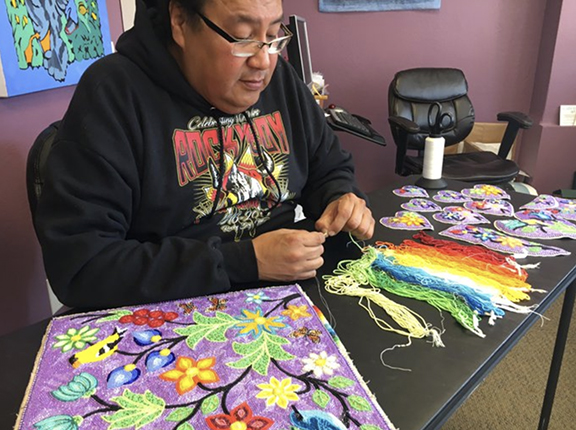Thomas Stillday awarded 2022 FPF Cultural Capital Fellowship
Bemidji, MN – Watermark Art Center has chosen Master Beader and Exhibiting Artist Thomas Stillday (Red Lake Nation – Obaashing Community) for the 2022 First People’s Fund “Cultural Capital Fellowship.” The First People’s Fund (FPF) fellowships are designed for artists and culture bearers who are deeply rooted in their communities and are committed to passing on ancestral knowledge and cultural practices within their tribal communities. Their work exemplifies the rich cultural diversity and highly sophisticated nature of Indigenous art practices today.
Stillday has devoted himself to designing, creating, and advancing his skills and visibility for 40 years. His progression as a beading artist began at age 13 with instruction from his grandmother. While he has developed his own distinct and personal style of work, his art honors the traditional beading techniques, designs and concepts given to him by his elders. His commitment to ‘making’ is important to the collective voice and continuing history of the Ojibwe cultural arts. Beginning March 17 and continuing for 10 weeks, Stillday will lead a drop-in beading circle for all skill levels at Watermark at no charge.
For more information on the First People’s Fund Fellowships, see FirstPeoplesFund.org.
For more information on Watermark Art Center or to view Stillday’s 2020 exhibit Wezhichigewaad, visit WatermarkArtCenter.org .
Tribes reach $590 million opioid settlement
Cleveland, OH (AP) – Native American tribes have reached settlements over the toll of opioids totaling $590 million with drugmaker Johnson & Johnson and the country’s three largest drug distribution companies, according to a court filing in U.S. District Court in Cleveland, which lays out the broad terms of the settlements with Johnson & Johnson and distribution companies AmerisourceBergen, Cardinal Health and McKesson. Some details are still being hashed out.
All federally recognized tribes in the U.S. will be able to participate in the settlements, even if they did not sue over opioids.
More than 400 tribes and intertribal organizations representing about 80 percent of tribal citizens have sued over opioids. Each tribe could decide whether to participate but would be required to use the money to deal with the opioid epidemic.
The deal would take effect when 95 percent of the tribes with lawsuits against the companies agree to the settlement, said Tara Sutton, a lawyer whose firm is representing 28 tribes.
The drugs, including both prescription drugs such as OxyContin and illicit ones including heroin and fentanyl, have been linked to more than 500,000 deaths in the U.S. in the past two decades.
Service providers lack resources to serve Native survivors of violence
Seattle, WA – The Urban Indian Health Institute (UIHI) released a report highlighting the experiences of direct-service providers who work with Native survivors of violence. The report, developed in partnership with the National Indigenous Women’s Resource Center (NIWRC), highlights available resources and ways programs, communities, legislators, and funders can better support Native survivors.
The report reveals a number of factors to address and meet the needs of Native survivors, including centering culture as a core part of service; increased access to housing and stability; direct legal representation; improved flexibility of grant funds; expanded LGBTQ2S+ services; and including Native youth and men in community prevention.
The report is accompanied by an Indigenous evaluation framework, which is intended for programs and service providers to incorporate Indigenous knowledge and community-centered practices into their care, and ways to collect more accurate data regarding Native people.
“It is an important time for our communities to have access to these resources,” said Abigail Echo-Hawk (Pawnee), director of UIHI. “More than 730,000 Native women are impacted by violence every year in the United States. It’s going to take action by Native and non-Native groups for our communities to begin healing.”
The report comes in light of the bipartisan reintroduction of the Violence Against Women Act (VAWA), which is now in the Senate, and other congressional bills, which would expand resources for victims of domestic abuse and sexual violence.
In 2021, Senators Patty Murray (D-WA) and Lisa Murkowski (R-AK) and Congresswoman Pramila Jayapal introduced the Survivors’ Access to Supportive Care Act (SASCA), which would develop national standards around the care for survivors of sexual assault and expand access to sexual assault examination services, including to Native communities.
“As a survivor myself, I am dedicated to ensuring Native communities have access to the resources and services they need,” said Abigail Echo-Hawk (Pawnee), director of UIHI.” VAWA and SASCA are great starts, but as our reports highlight, there is a lot more work to do to serve Native survivors of sexual violence. We can and should do more to help our communities heal.”
The report can be found at: https://www.uihi.org/resources/building-the-sacred-an-indigenous-evaluation-framework-for-programs-serving-native-survivors-of-violence
Rebuilding Together MN accepts applications for free home repairs
St. Paul, MN – Qualified homeowners throughout the Twin Cities can receive free home upgrades to help them live safe in their home longer, thanks to Rebuilding Together Minnesota’s Safe at Home Program. Applications are now being accepted until April 1, 2022 for work to take place later in the year.
The nonprofit manages the necessary home updates through professional contractors and/or skilled volunteers to prevent accidents such as installing grab bars, handrails, accessibility ramps and motion lighting. In addition, the organization is now offering free roof repairs thanks to new grant money.
“The work our teams do allow homeowners to live safe in their homes for a longer period of time, extending their quality of life and peace-of-mind,” said Kathryn Greiner, executive director of Rebuilding Together Minnesota. “Since our start in 1997, we have rehabilitated more than 1,300 area homes, investing more than $7 million in needed improvements.”
To qualify for assistance, applicants must own and reside in their home for at least two years, live at certain household income level and have one household member who is at least 55-years-old or someone living with a disability.
To apply or to learn more, visit www.rtmn.org, click on the “Apply for Help” tab, then “Safe at Home Program” and download an application at the bottom of that page, or call 651-776-4273. Applications can be completed online or completed by hand and mailed by April 1, 2022.






